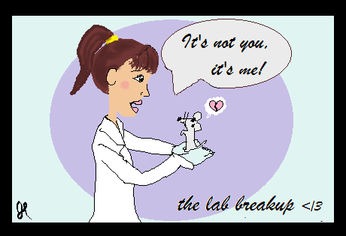 Dread going to lab? Perhaps it's time to switch! By Stephanie Wang [Republished from 11/01/2011] "This research topic doesn’t seem to interest me." "I feel like I am not getting much guidance and support in this lab." "Going to lab just isn’t enjoyable for me anymore." You’re struggling in your relationship with your lab. There’s no passion, no excitement. All you’re feeling is a sense of being tied down and of being forced to do menial tasks with no end in sight. It might be that the subject of your research no longer tickles the science nerd in you or that your lab community isn’t the nurturing place that can bring you closer to your life goals. Whatever it is, suddenly, you realize that this lab isn’t a good fit for you. It’s a signal for a lab breakup. This is not something you necessarily conclude overnight. I came to the realization myself earlier this semester, as a junior. Even though I worked on a particular project for a whole semester and part of a summer, my relationship with my research was falling apart. It became apparent to me as I met with my principal investigator (PI) during the first week of school and talked with him about spending more time in the lab this year. Imagining my life with a large chunk of it spent in lab only made me feel dread and apprehension: It was a sign. In addition, although my PI, a highly intelligent and quirky guy, was more than willing to support my work in his lab, he was not as excited to support me as a person. From the laboratory grapevine, I came to understand that he looks down upon the MD degree, seeing it as a cop-out to the far superior PhD. I would always approach him with fear if it ever came down to being honest with him about my future career. Yet, what finally got me was not being able to pursue the aging project that had enticed me into joining the lab in the first place. It had never been my plan to study tail-anchored protein insertion into the endoplasmic reticulum (ER). The ER project was only supposed to be a stepping stone for another project about aging’s effects on protein misfolding. Apparently, though, the aging endeavor still lacked focus, and my PI was adamant about giving me a thesis question that could be clearly and feasibly answerable in the next year and a half. I understood his logic, but knew I would be miserable if I spent even more time studying protein insertion pathways into the smooth ER. "For me, switching [labs] was the best option. However, as a junior, was I too late? Over and over again, I was told, 'Not at all!'"  Comic by Julia Tartaglia I was so frustrated at the idea of working on ER proteins that I completely forgot about my freedom to search for a new lab until later on in my junior fall. Realizing this was a huge step for me to remedying the unhealthy relationship I was developing with my research. This is not to say that you should immediately switch labs upon feeling unsatisfied with your project. It is best to first ask your PI if there are possible projects that you can switch into that suit your interests more. For example, I talked with another member of the ER lab about his project on aging first before approaching entirely new labs in order to see if there was anything that interested me in the lab I was already working with. Unfortunately, I was told that the aging project was still very preliminary and that there was a chance I may not move forward in the one and a half years I have left of college. If, like me, there are no other projects suitable for your interests, then there is more reason to begin considering a new lab. For me, switching was the best option. However, as a junior, was I too late? Over and over again, I was told, “Not at all!” Doing research is a huge time commitment— it is like a relationship in many ways. Sometimes you love it, sometimes it’s frustrating, but overall, it should be rewarding and you should ultimately be passionate about the topic you delve into. If you find that you’re in a destructive cycle of anxiety or disinterest, I’m here to tell you that there is a way out! So, if you’re in the same situation I was in, the question you might be asking yourself now is, how do I go about finding a new lab after having had a history with another? Or, if you have never done research and would like to begin, how do I start a relationship with research at Harvard?
5 Comments
Leave a Reply. |
What's HotGet the DigestAbout the Blogger
Stephanie M. Wang is a Chemical and Physical Biology major at Harvard College, Class of 2013. She is a pre-med who just can't get enough of the hard sciences. She loves learning new things, frisbee, poetry, every kind of apple, people. Stephanie blogs regularly for the Scientista Foundation: Find her blog here!
More From Stephanie |
The Scientista Foundation, Inc. All Rights Reserved © 2011-2021 | Based in NY | [email protected]
The Network for Pre-Professional Women in Science and Engineering
The Scientista Foundation is a registered 501(c)(3) -- Donate!
The Network for Pre-Professional Women in Science and Engineering
The Scientista Foundation is a registered 501(c)(3) -- Donate!









 RSS Feed
RSS Feed